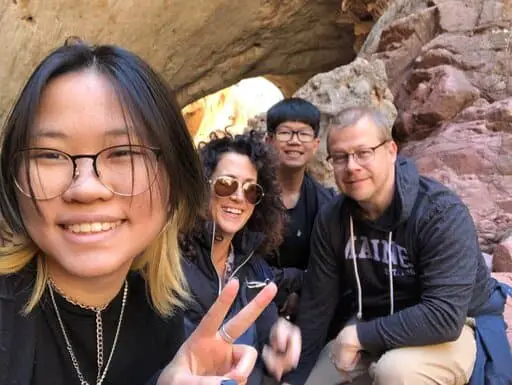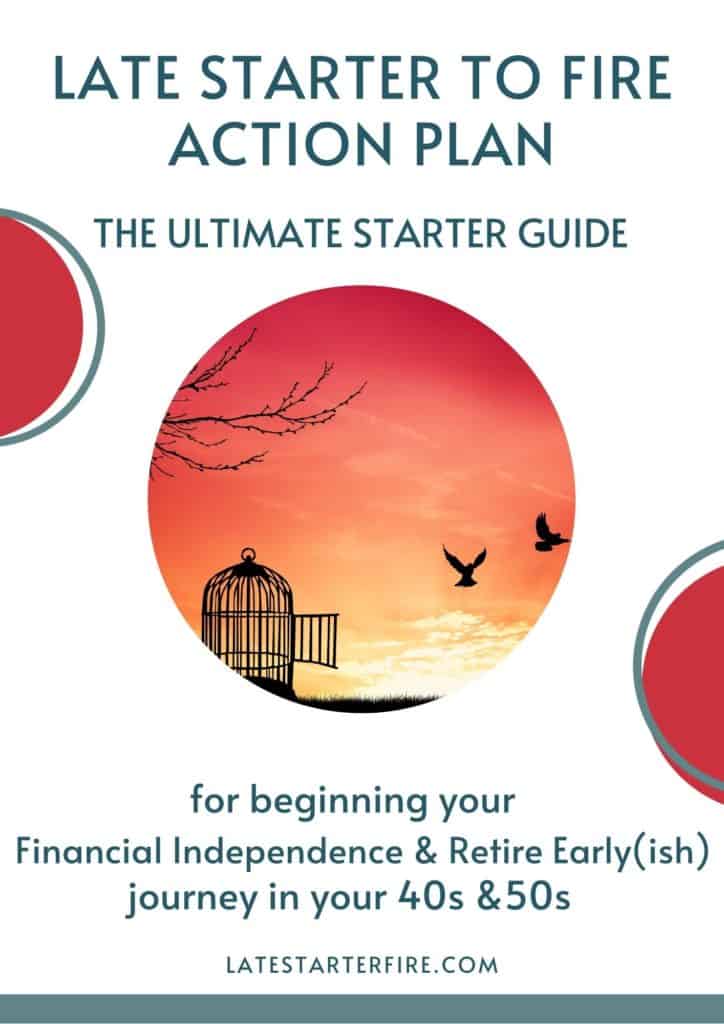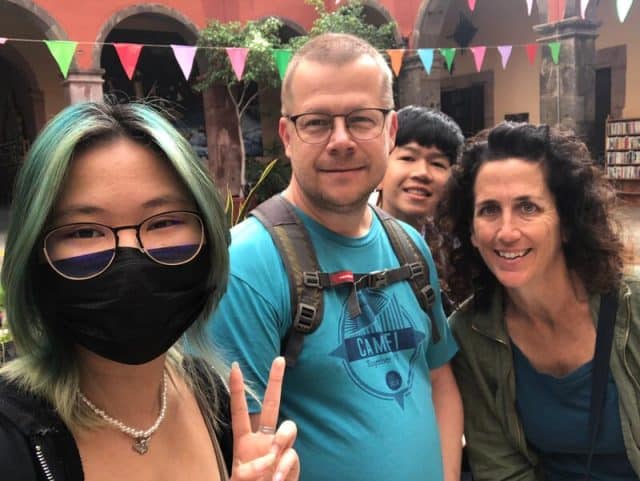
Disclosure: Please note that I may benefit from purchases made through my affiliate links below, at no cost to you. Additionally, as an Amazon Associate, I earn from qualifying purchases. Thank you for your support
We all know what is good for us.
More exercise.
Eat better food.
Save for retirement.
Sometimes, we even know HOW we should go about doing it.
So, what is stopping us? Or preventing us from starting? What is the difference between those of us who persist and those who quit when the going gets tough?
The answer is – our mindset.
The longer I’m on my FIRE (Financial Independence Retire Early) journey, the more I realise how many hang ups I have about money. And that how I think or feel or believe about money ie my money mindset, greatly influences the outcomes I’m trying to achieve.
When I first learned about money mindset, I thought it was all a bit woo woo. I’m practical, if nothing else! I wrote about how I transformed my limiting money beliefs after reading Jen Sincero’s book – You Are A Bad Ass At Making Money.
If you are a late starter like me, we’ve had a lifetime of absorbing these beliefs and attitudes. Most of the time, we’ve done so unconsciously, picking them up from our childhood and life circumstances.
I’ve discovered these are the 3 most common money mindset traps for late starters who are pursuing FIRE. Let me know in the comments if any of these resonate with you.

Feeling Overwhelmed?
Use this FREE Checklist to start your journey to Financial Independence
I've NEVER been good with money
There’s probably a lot of proof that we haven’t been ‘good’ with our money. But I’m sure there is also proof that we’ve made some sensible financial decisions in our past. It’s just that our brains prefer to latch on to the negative side of things.
I know for me, the thought that I’ve never been good with money has a lot to do with not investing once I bought my house.
If only I hadn’t stopped investing, I’d be FIRE’ed by now. This is a refrain that can go on repeat in my head, especially when it’s a stressful day at work. And I just want to be FIRE’ed RIGHT NOW.
But it also frequently turns into – see, you should’ve been better with money. You’ve NEVER been good with money.
To turn that around, I now think – But I AM taking action now. I am investing in and out of superannuation (retirement account) and saving via sinking funds. I know my priorities now. I have a plan of action to reflect that and I’m following it. I am getting better with money.
In other words, I give my brain something else to think about. I present it with evidence that I am making better decisions around money.
If the thought ‘I’m good with money’ is too far reaching for you, then use a ‘bridging’ thought – ‘I’m getting better with money’.
It's too late for me now
What’s the point? I’m already in my 40s, 50s … it’s too late for me now. Whatever I do now will not be enough, so why bother? I’m destined to never retire.
Sound familiar?
I thought the same thing when I discovered FIRE at 47.
But then decided to have a go anyway, as we Aussies like to say.
After all, if I did nothing, I’d be in the exact same situation as I am now. There is just the chance, however slight, that my situation may improve if I did something, anything.
And it is AMAZING what taking action will do.
Despite starting later than most in the FIRE community (where the ‘traditional’ FIREee retires in their 30s),, I am on track to retire at 55.
Sure, I had some savings in retirement accounts including one that I hadn’t contributed to for decades. But had I not started to take action when I did, my retirement savings would still be slumbering.
I consolidated the two superannuation accounts and decided what to invest in. And now, I’ve reached Coast FI.This means that even if I never contributed another cent to my superannuation, it should continue to grow to my desired number by the time I can access it at age 60.
So it’s never too late to start taking action. Any improvement in your finances is better than no improvement at all.

I'm not gung ho enough for FIRE
Then once I embraced FIRE, I felt like a fraud in the FIRE community.
I wasn’t eating rice and beans. My food costs for one person is more than that of a fellow blogger with a partner and 2 children.
The young ones are side hustling with a passion and negotiating pay rises. I don’t want the extra responsibility to justify a pay rise. I’m trying not to get back on the path to burning out – been there, done that. Never again, shudder!
A few years into my FIRE journey, I can say with confidence that it’s best if you don’t compare your circumstances, savings rate, priorities etc with anyone else’s.
The better question to ask is – am I progressing in the right direction? If the answer is ‘yes’, leave it be. You’re doing a good job.
Can you do it faster? More aggressively?
Of course you can. But what is the trade off?
Consider your mental health. For example, juggling jobs or side hustles may result in a lack of time to spend with family and friends. Consider your health. Is the extra stress causing other medical issues such as high blood pressure?
Your FIRE journey is yours, unique to your circumstances. Know what you will give up to reach FIRE faster and know what you won’t. Sometimes, it’s only for a while until we sort out our finances and that’s ok.
My philosophy is that there is no point in reaching my destination of FIRE, only for ill health (physical or mental) to sabotage my enjoyment of it.
The shame
What we don’t talk about much in the FIRE community is how much shame we carry around these negative money mindsets.
First, there’s the shame that we haven’t been good with money all our lives. We are ashamed of the debt we racked up. We are ashamed of our paltry retirement savings.
Then there’s the shame that we’ve left it so late and now must play catch up. We have to learn from the young ones crushing it.
Lastly, there’s the shame that somehow we are not doing enough, not gung ho enough to be in the ‘proper’ FIRE community.
We may not have it within us to go back to living like we did at college – eating two minute noodles and vitamin pills (which is exactly what my friend did at university). Not now when we are finally earning decent incomes and are used to a more comfortable lifestyle.
Late starters, we must forgive our past selves. And grant our current selves more grace.
We can’t change our past mistakes and dodgy financial decisions. BUT our future is very much in front of us.
The second half of our lives is still ahead of us. We may live till our 90s!
We owe it to ourselves and our families to get our $h*t together now and start taking action.
Earlier retirement is possible. That dream holiday is possible. Whatever your dream is, it is still possible.
We know better now. We can do better now. If we start taking action.
It’s time we let go of our shame and our past and embrace our future.
Money affirmations
I know all this sounds a bit woo woo but it works. Once your brain is presented with a different view, it will start showing you evidence of things working. And opportunities will open up.
These are some of my favourite money affirmations.
Choose one appropriate to your situation and repeat it to yourself daily. Write it in your journal. Put it on a sticky note on your bathroom mirror so it’s the first thing you see in the morning and last thing you see before bed. You get the drift.
– I am taking charge of my financial destiny
– Every action I take will lead to financial freedom
– I am getting better at managing my money
– I enjoy telling my money what to do
– My financial future is not set in stone. I have the power to change it.
– I am grateful for all the money I have
– My financial future is so much brighter than my past
– I am capable of making good financial decisions
– Money comes to me easily and abundantly (this is mine right now!)
– I deserve financial abundance
Now, please don’t think that just by saying or thinking these affirmations, it is enough for you to reach FIRE. Of course not!
But together with deciding what your priorities are and taking action such as reining in your spending, increasing your income and investing the difference, it will do wonders for your financial situation. And they will keep you focused on the job at hand.
Final thoughts
The 3 money mindset traps for late starters to FIRE can be overcome by thinking new thoughts and taking action.
Positive money affirmations can help us by reinforcing the actions we are taking towards financial independence. They interrupt our pattern of negative thoughts and feelings of shame.
Most importantly, it’s time to forgive our past selves for the financial mistakes we made. And move forward with confidence that our financial future is much, much brighter than our past.
So, late starters, don’t let these money mindset traps stop you from getting started on your FIRE journey. Or derail you from your plans.



